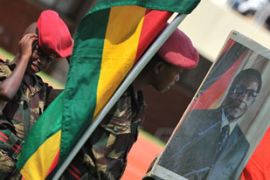Mugabe urges end to violence
Zimbabwe’s president calls for tolerance as country marks 30 years of independence.

Human rights groups say that hundreds of people have been killed in political violence over the past 10 years, with opposition supporters blaming much of it on supporters of the president’s Zanu-PF party.
Power sharing
Mugabe, a former school teacher and leader of the independence struggle, entered a power-sharing government with arch-rival Morgan Tsvangirai, now prime minister, after a political crisis sparked by a disputed general election in 2008.
Although the Zanu-PF and Tsvangirai’s Movement for Democratic Change (MDC) continue to argue over the pace of change and appointments of senior state officials, Mugabe said on Sunday that the power-sharing deal was working.
| IN VIDEO | ||
| ||
| The Rageh Omaar Report |
“Many of the key provisions of the global political agreement which is the maker of our inclusive government, have been and continue to be in the process of being fulfilled,” he said as Tsvangirai looked on.
Mugabe also said that Zimbabwe would continue with plans to transfer 51 per cent of shareholdings in foreign companies to black Zimbabweans.
“The economic empowerment policies are chiefly designed to redress the historic imbalances in the ownership of the economy,” he said.
The policy has been criticised by Tsvangirai and other members of the MDC, who on Wednesday said that the cabinet, chaired by Mugabe, had shelved the act.
Al Jazeera’s Haru Mutasa, reporting from Harare, said that the so-called “empowerment” law showed that there were problems between the two parties in the power-sharing government.
“The president tried to tell his people that the inclusive government is working but clearly there are differences behind the scenes,” she said.
But she said that many ordinary Zimbabweans remained pleased that the power-sharing administration exists after the turmoil of the disputed elections and the country’s economic crisis.
“The fact they are not getting along is not a big concern outright, they just want them to at least pretend to get this government to work so that outside investors can maybe think of coming to the country.”
‘Celebrating’ independence
Traffic jams clogged the streets around the National Sports Stadium as Zimbabweans gathered by the thousands for Sunday’s celebrations.
The stadium in the capital, Harare, was decked out in Zimbabwean flags, but participants wore normal clothes after a warning earlier in the week that political gear and party regalia would not be allowed.
|
“Instead of celebrating freedom, a lot of people are preoccupied and are rightly worried about their lives and the future” Lovemore Madhuku, |
“I come to celebrate the independence my last heroes fought for,” Brian Kasunzumuma, a 27-year-old vendor, told the AFP news agency.
“I come here every year to celebrate independence as a Zimbabwean.”
Mugabe has been blamed for the ruin of the country in recent years, as it went from being an agricultural powerhouse and educational beacon, to having a stagnant economy and continuing political crisis.
Millions of Zimbabweans have fallen into poverty since independence and millions more have crossed into neighbouring countries to seek jobs and food.
“It should be a landmark anniversary, but unfortunately for many people it is a time to count lost opportunities, and wasted lives,” Lovemore Madhuku, a political commentator and head of pressure group National Constitutional Assembly, said.
“Instead of celebrating freedom, a lot of people are preoccupied and are rightly worried about their lives and the future,” Madhuku said.
“There is very little happening around us to give anyone any sense of comfort.”
